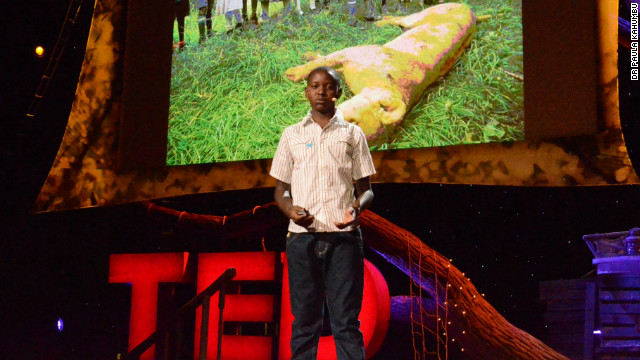The top 6 skills today’s employers want

After four years of college, my son is about to graduate with a degree in Environmental Politics. We are both aware that he is entering the job market at a time when more and more young people cannot find work.
While putting together his résumé, he recently asked me what kind of skills today’s employers want from a new job candidate. A lot of people his age are probably asking the same question, so I thought I’d share a few thoughts.
According to recent surveys, employers these days aren’t just looking for experience. They’re also interested in “softer skills” like problem-solving and creativity that can play as big a role in career advancement as training or education.
View original post 547 more words
Inginuity lands this boy a scholarship to the most expensive school in the country
STORY HIGHLIGHTS
Richard Turere, 13, has found an innovative way to protect his family’s cattle from lions
He created “Lion Lights,” which keeps the predators away from the family’s enclosure
The Kenyan boy will speak about his invention at the TED 2013 conference
(CNN)— Richard Turere, 13, doesn’t like lions. In fact, he hates them. Yet this bright Maasai boy has devised an innovative solution that’s helping the survival of these magnificent beasts — by keeping them away from humans.
Living on the edge of Nairobi National Park, in Kenya, Turere first became responsible for herding and safeguarding his family’s cattle when he was just nine. But often, his valuable livestock would be raided by the lions roaming the park’s sweet savannah grasses, leaving him to count the losses.
“I grew up hating lions very much,” says Turere, who is from Kitengela, just south of the capital Nairobi. “They…
View original post 918 more words
As a college freshman learning web development, how can I not feel insecure about not being as good as programmers and hackers that start…
Answer by Neal Wu:
Make sure you realize it's not a competition.
Success isn't a zero-sum game. Instead of feeling jealous, try to change your attitude: if there are people are around you who you think are way ahead of you, that's awesome! Seek them out and learn as much as you can from them. In the process they'll gain perspective as well, just from teaching you the concepts and having to explain things from the ground up. And if for some reason they don't think you're worth their time, don't worry; keep looking and you'll find someone who's willing to help.
Another thing I've found is that a key ingredient for success at anything is raw excitement. Take any chess grandmaster or Wimbledon winner, and you can be sure that when they started, they had no idea what they were doing either. How did they reach the top? Yes, through lots of practice, but plenty of people can just put in the number of hours. I've noticed what often separates the "very top" from the "pretty good" is that the people who are really the best at something are also the ones who have the most enthusiasm for it, the ones who put the most energy into it. And if you ask them, they'll usually say they were happy to put in all the time anyway, win or lose.
So basically, do it if you like it. Don't let your late start stop you! (And honestly, you're not starting that late at all.) If you really enjoy it, you'll quickly find that you've learned much more than you ever thought you would.
How are female students treated at MIT?
Answer by Anon User:
I'm a girl studying computer science at MIT, and while I've been treated with fairness and respect (for the most part), I have seen some male students talk about the female half of the student body with disdain. Contrary to what you might expect, many of the comments are about female students' looks rather than their smarts.
Some male students joke about how unattractive Course 18 (math major) girls are, or how unattractive the female MIT population is in general. At least one fraternity that I know of hosts some parties where no MIT girls are allowed. There's subtler expressions of prejudice, too. If you're an attractive girl roaming the MIT campus and a guy meets you for the first time, he might ask if you go to MIT – because they believe you most likely go to Wellesley or BU instead. You learn to try and take these things as a compliment.
Then there's the fact that some guys don't like dating MIT girls because they don't want to be reminded of schoolwork and stress. And I get it; it can be tough dating someone who is always as stressed as you are. I'm sure there are other reasons some MIT guys discriminate against MIT girls when it comes to hookups and/or relationships. Some are probably more confident when they're courting a non-MIT girl because they think girls from other schools find the MIT brand name desirable. (The same goes for many guys from any "top" school, though.)
When I was a freshman, I did some real-life A/B testing to see if guys who approached me at parties stuck around longer if I told them I was a Wellesley student rather than an MIT student.* The sample size was way too small (3 people each) for this to be remotely scientific, but all the guys who heard I was a Wellesley student stuck around and tried to dance with me, etc., while 2 of the 3 guys who heard I was an MIT student left shortly thereafter. Of course, it could have been a coincidence.
Do MIT guys view the girls as intellectually inferior, though? I think largely not, though I could be mistaken. Female-dominated majors range from those perceived as easy (Course 9, Brain & Cognitive Science), to intermediate (Course 7 – Biology), to difficult (Course 4 – Architecture). [1] [2] At MIT, prejudices stem mostly from major rather than gender.
I do personally know a handful of guys who genuinely believe girls are, on average, not as technically competent as their male counterparts. These guys acknowledge their bright and capable female peers as equals, but tend to see them as exceptions rather than the rule. Please keep in mind that this mindset is not the norm at MIT, and that for the most part, girls and guys are viewed as intellectual equals. (If anything, it's the Harvard/Wellesley/BU students who are undeservingly mocked as intellectually inferior.)
That being said, many girls I know don't do hardcore engineering/science jobs after graduation. It may be due to the lack of confidence instilled in them during their undergraduate years, though I have absolutely no idea about each girl's own decision. I personally will not attempt to pursue a fully technical (i.e., coding/software engineering) job after graduation due to, yes, low self-confidence in my technical abilities. I don't want to make one mistake and forever lower my male peers' opinion of all women, ever, in the history of the world. This, however, merits a separate discussion, as I don't think many of my girlfriends think the same way.
I don't think the currently-existing efforts to support women in STEM at MIT are really effective; in fact, they mostly serve as a target for (male) trolls who like to show up at women's groups' events just to take free food. Talking about issues like the gender gap annoy some guys I know; they disparage the achievements of women like Sheryl Sandberg and Marissa Mayer because, they say, these women wouldn't get the same widespread recognition for their work if they were men. You have to understand that many MIT students live in a bubble of meritocracy and have trouble comprehending the subtle politics of the real-world workplaces; here, it seems unfair to guys that there are so many resources dedicated to helping women achieve more, when they don't seem to deserve the extra attention. The women who get ahead at MIT are feminine, smart, don't seem to make a big deal out of being a girl.
*I realize this makes me sound really awkward.
[1] Major enrollment statistics, females only: http://web.mit.edu/registrar/sta…
[2] Major enrollment statistics, all students: http://web.mit.edu/registrar/sta…
What are the main differences between a Masters and a PhD in computer science?
Answer by Vijay Chidambaram:
The best answer I've seen to this question is by Prof. Matthew Might on his blog. Like many great answers, it uses pictures (taken from The illustrated guide to a Ph.D.):
Imagine a circle that contains all of human knowledge:
By the time you finish elementary school, you know a little:
By the time you finish high school, you know a bit more:
With a bachelor's degree, you gain a specialty:
A master's degree deepens that specialty:
Reading research papers takes you to the edge of human knowledge:
Once you're at the boundary, you focus:
You push at the boundary for a few years:
Until one day, the boundary gives way:
And, that dent you've made is called a Ph.D.:
Extending this boundary of human knowledge gives you a number of other skills apart from the knowledge gained (as explained in Vijay Chidambaram's answer to PhD Careers: If a PhD doesn't go into research or industry in his or her chosen field or specialty, what is he or she actually more qualified than college graduates to do?):
Ability to work independently. The degree is not conferred until the candidate has proved to experts that he or she has produced original work and advanced the state of the field in some way. Though some work may be done in collaboration, the ideas as such must originate with the degree holder.
Critical thought. Extending the state of the art cannot be done without knowing what is wrong with the current state. A PhD candidate learns to critically examine the thoughts of others and pick out the pros and cons.
Perseverance. Getting the degree is a long and arduous journey that tests the determination of the candidate.
Ability to work with poorly defined goals. One of the bigger hurdles of the PhD is that there is no clear cut goal. You know you have to do original research, but no one can exactly say these are the things you need to do every day to do it. Research as such involves going back and forth, exploring blind alleys and so forth.
Effective communication. The candidate must be able to communicate about his or her research effectively, at least on paper. The better candidates will be able to communicate through oral presentations as well.
Though a Master's degree equips one with specialized knowledge, most of the above skills are not learnt during a Masters degree. Do note that you don't need any degree to acquire the above skills on your own.
A masters degree equips you to do high level, complex design and potentially lead software engineering teams.
A PhD degree equips you to do original research and potentially lead R&D teams.












